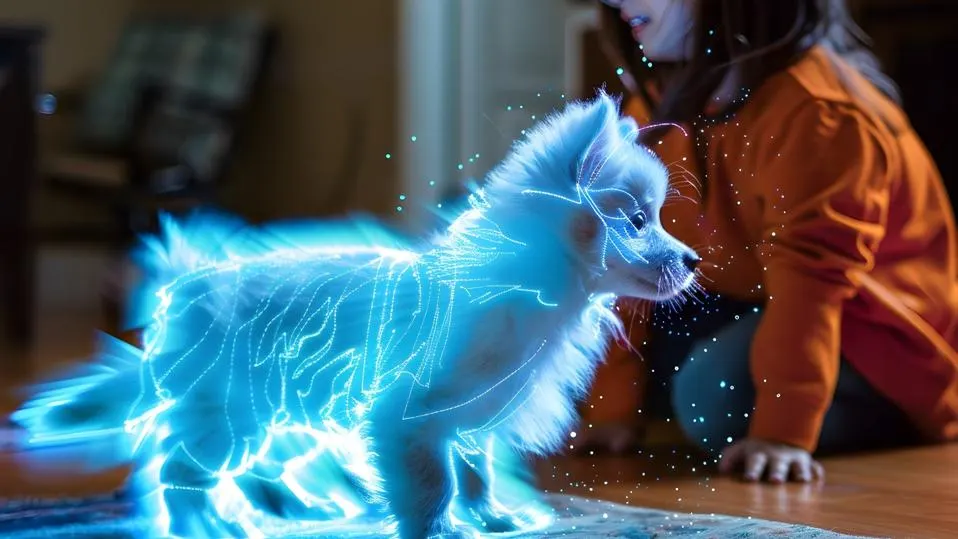The Rise Of AI-Enabled Virtual Pets: Why Millions Are Raising Digital Companions
18 November 2024
Remember Tamagotchis? Those tiny digital pets that had millions of kids frantically pressing buttons to keep their virtual companions alive in the 1990s? Well, they’ve evolved into something far more sophisticated: AI-enabled virtual pets that can talk, learn, and form genuine connections with their human caretakers.

Why Virtual Pets Are Making A Comeback
In an era where technology often gets blamed for increasing isolation, companies like Slay are taking a different approach. Their viral hit app Pengu has become the biggest AI character app in the US, but with a twist - you can't raise your virtual pet alone. It requires two people to care for each Pengu together, creating a social experience that bridges digital and human connections.
The Power Of AI In Creating Digital Life
What sets modern virtual pets apart from their predecessors is the sophisticated AI technology behind them. Using large language models, these digital companions develop unique personalities and can engage in meaningful conversations. "We were leveraging LLMs on scale to give Pengu personality and character traits," says Kamberi. The app offers several ways for users to interact with their virtual pet. Through a digital diary feature, users can follow their Pengu's daily adventures and experiences, creating a sense that their pet has its own ongoing life. Users can also engage directly with their pet through text conversations and voice interactions, making the relationship feel more personal and natural.
The technology also enables virtual pets to remember past interactions and maintain context over time. For example, they can recall previous conversations, remember important events, and even help with homework. The AI adapts to create a personalized experience for each user while maintaining appropriate boundaries and safety measures.
"If you think about how many people in the US have real-life pets, you see that there's a huge demand," explains Fabian Kamberi, CEO and co-founder of Slay. "I think we have been the first company that has been able to get users to engage with an AI character on scale, which hasn't been done before."
Building Safe And Meaningful Connections
One of the biggest challenges in creating AI companions is ensuring they foster healthy relationships. Slay has tackled this by making their virtual pets inherently social experiences.
"When you give love to Pengu, it implies that you think about your friend and you're raising something together," Kamberi explains. "The gamified mechanic is that you obviously progress together, and you achieve stuff, and you play games."
The company has also implemented strict safeguards to prevent inappropriate interactions and ensure the experience remains positive, especially for younger users. This includes pre-filtering content and creating an environment where the virtual pet feels more like a family member than a chatbot.
The Future Of Digital Companionship
Looking ahead, Kamberi envisions a world where virtual friends become commonplace. "I do see that everyone will have virtual friends at some point. Virtual characters that we might engage very differently with. So, let's say I have a character that I raise with my girlfriend, and I have a character that I raise with my mom."
This future isn't just about creating digital alternatives to real pets - it's about enhancing human connections through shared digital experiences. The technology continues to evolve, with companies like Slay exploring 3D experiences and new ways to make virtual characters feel more lifelike and engaging.
A New Chapter In Human-AI Interaction
As AI technology becomes more sophisticated and accessible, virtual pets like Pengu are just the beginning. They represent a new paradigm in how we interact with AI - not as a replacement for human connections but as a bridge that brings people together through shared experiences and emotional bonds. Yet we must ask ourselves: in a world already dominated by screens and digital interactions, do we really need another layer of technology mediating our relationships?
This vision of the future raises important questions about the nature of human connection. While AI-enabled virtual pets might help create meaningful connections in our increasingly digital world, they could also further normalize the replacement of real-world interactions with digital alternatives. As these technologies continue to advance, we'll need to carefully balance the benefits of AI companionship with the fundamental human need for authentic, unmediated relationships. The success of apps like Pengu suggests many people are ready to embrace digital pets - but the long-term implications for human social development and emotional well-being remain to be seen.
Related Articles
Flying Taxis And Self-Driving Trucks Arrive In 2026: 6 Transport Trends To Watch
By now, “smart” versions exist of just about every home appliance, gadget and gizmos we can think of. However, manufacturers continue[...]
Technology in Action: My Key Takeaways on How AI and Quantum Are Accelerating Global Transformation
By now, “smart” versions exist of just about every home appliance, gadget and gizmos we can think of. However, manufacturers continue[...]
The 10 Biggest Consumer Technology Trends Of 2026
By now, “smart” versions exist of just about every home appliance, gadget and gizmos we can think of. However, manufacturers continue[...]
8 AI Ethics Trends That Will Redefine Trust And Accountability In 2026
By now, “smart” versions exist of just about every home appliance, gadget and gizmos we can think of. However, manufacturers continue[...]
The 7 Banking And Fintech Trends That Will Define 2026
By now, “smart” versions exist of just about every home appliance, gadget and gizmos we can think of. However, manufacturers continue[...]
The 8 Biggest Healthcare Technology Trends To Watch In 2026
By now, “smart” versions exist of just about every home appliance, gadget and gizmos we can think of. However, manufacturers continue[...]
Sign up to Stay in Touch!
Bernard Marr is a world-renowned futurist, influencer and thought leader in the fields of business and technology, with a passion for using technology for the good of humanity.
He is a best-selling author of over 20 books, writes a regular column for Forbes and advises and coaches many of the world’s best-known organisations.
He has a combined following of 4 million people across his social media channels and newsletters and was ranked by LinkedIn as one of the top 5 business influencers in the world.
Bernard’s latest book is ‘Generative AI in Practice’.










Social Media